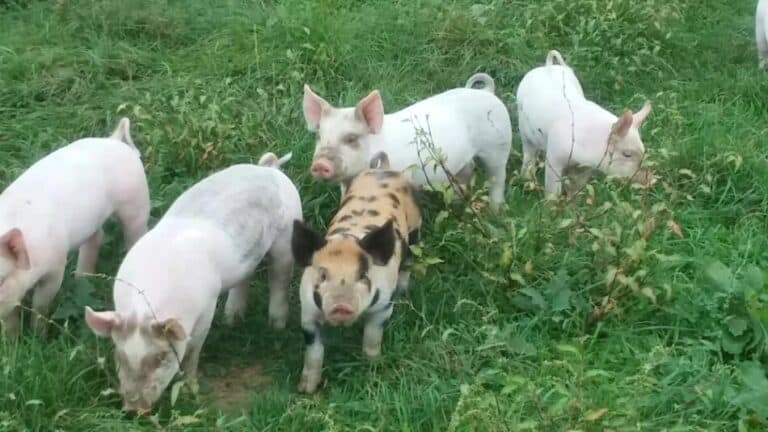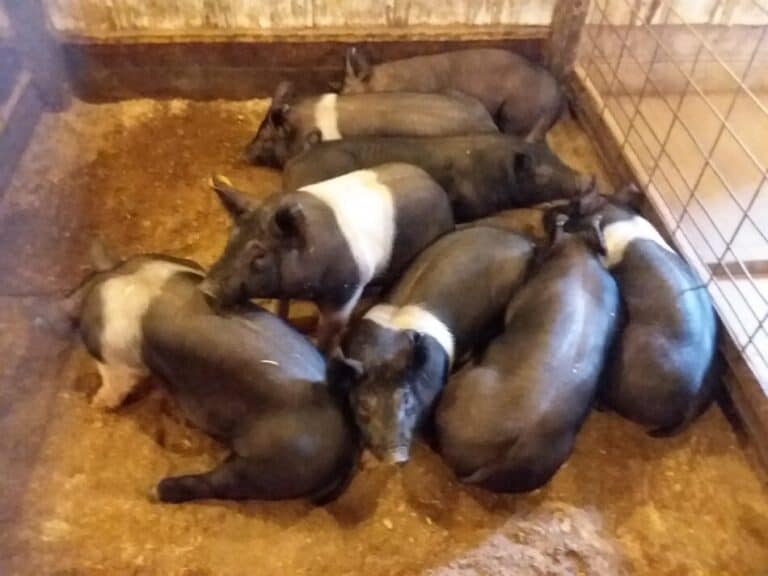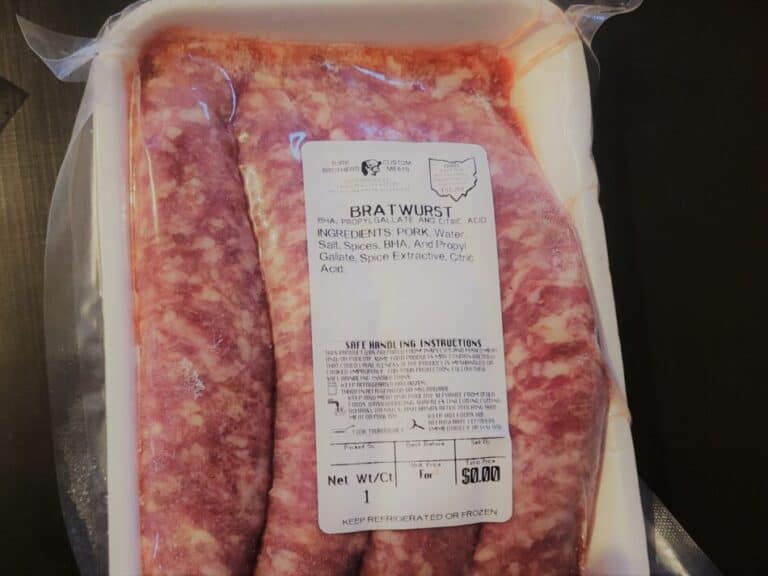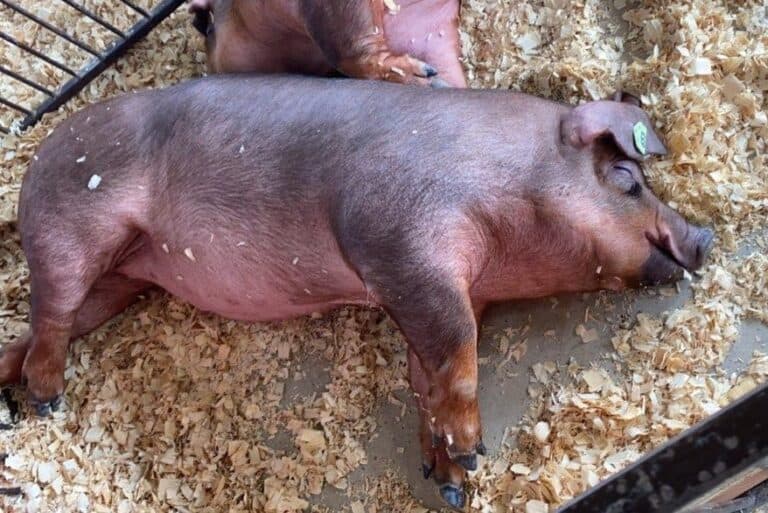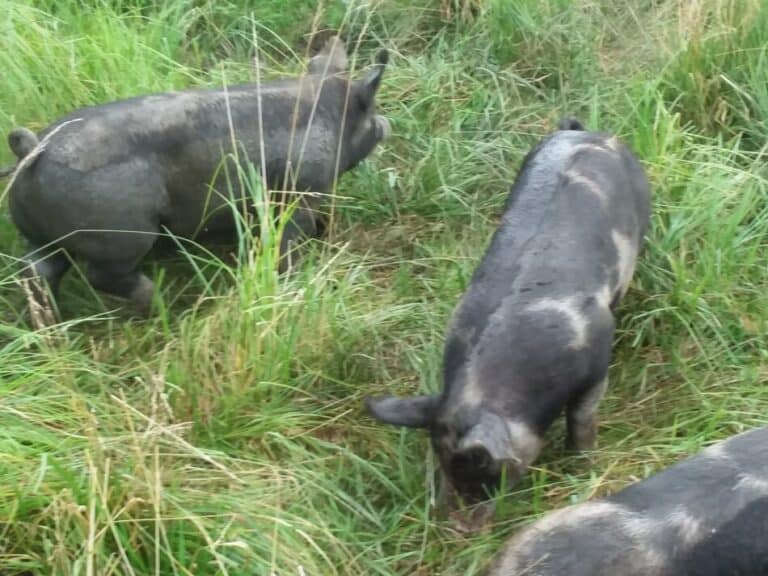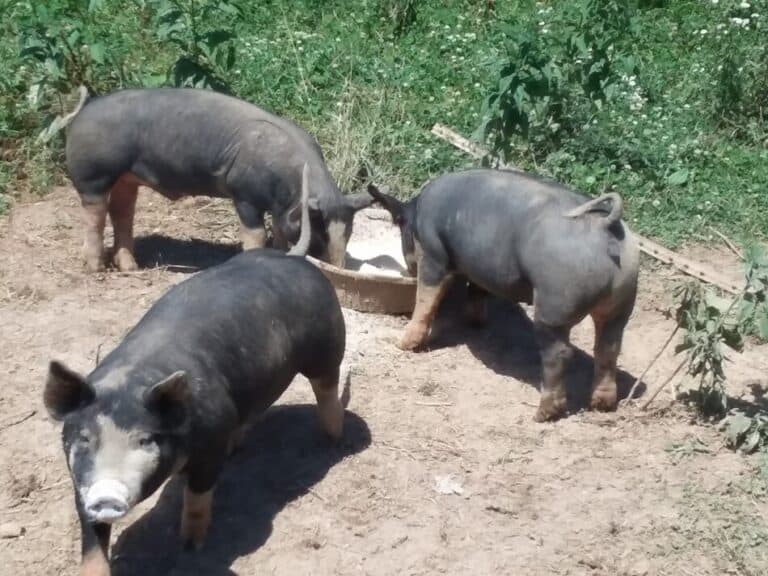Are Pigs A Good Investment?
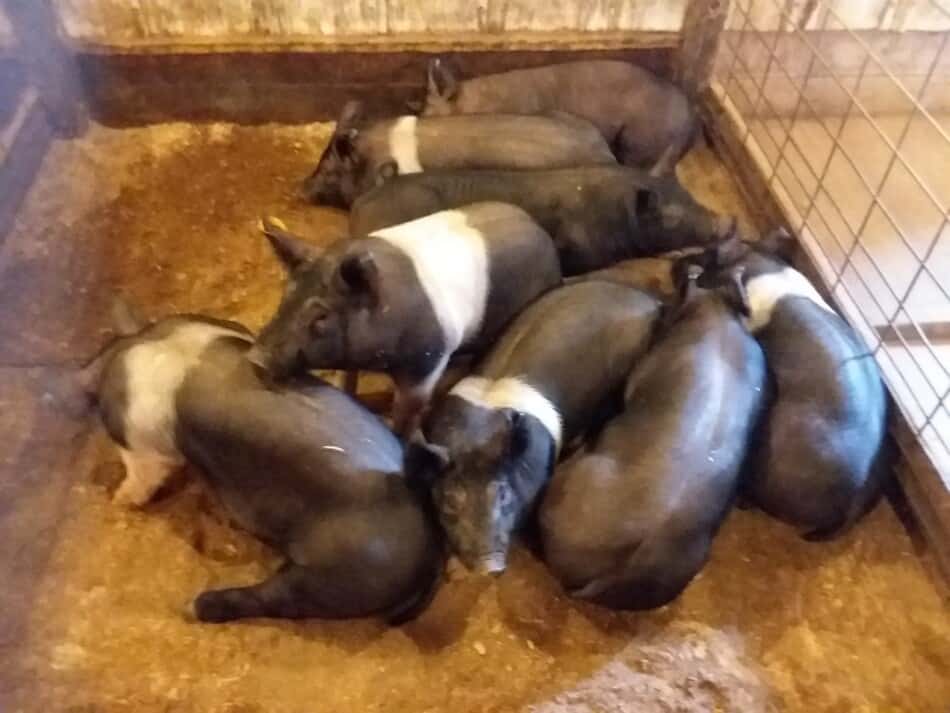
Consumers want pork from pigs raised in a happy and healthy environment, pigs that live a good life. The opportunity to make a business out of raising healthy pigs is high in many parts of the world.
What’s the outlook for pigs in your area? Are pigs a likely good investment of your time and resources?
Pigs can be a good investment in areas that have a high customer demand for pigs and pork and have the support structures in place, like feed supply, veterinary care and processing facilities, to run the pig operation.
I wrote that pigs “can be a good investment” because the success depends upon how you run your business and your animal husbandry skills.
Here are the things you need to have figured out before you get started to know if pigs are a great plan for you and your area, or not.
Best Feed For Pigs will go over feed options, which will vary depending upon where you live.
Some areas have huge opportunities in unused food, like restaurant or brewery waste that would be great for pigs and lower feed costs.
Determine if there is a need for pigs in your area
Is there a need for pigs in your area? While this is such a basic question, it is almost too obvious to ask, it is the foundation of your business. Will your pig operation have customers? No customers = No business!
You have to provide something the area needs if you want your business to be successful. Are people or processors having a difficult time sourcing pork? If so, pigs sound like an opportunity for your area.
If you want to raise pigs, just because you want to raise pigs, that’s fine, but not a business, this would be a hobby. A business looks to the needs of the area and fills a need.
The next pretty obvious question is can the people who want your pigs get them and pay for them?
While the pay for them part is easy, folks will either change their spending habits to get your pigs or pork or they won’t, the get them part is more challenging, here’s why: regulations.
Depending upon where you live the regulations for how you can sell your pigs may be overly burdensome or may be non existent.
Here, Ohio, leans toward regulation, meaning I have to go through an inspection channel to get meat to customers. Private sales of animals are not regulated, as long as the animals do not cross state lines.
Know where you will sell your pigs
Now that you know folks in your area want pigs, how do you plan to sell the pigs to the customers? And in what form, whole hogs, halves, retail cuts, or live pigs from your farm or at an auction?
I’m figuring you want to have the piglets born at your place, super! What will you do with the extras or the off season pigs?
If you can find customers for most of your market hogs, the extras can be sold through commercial channels like an auction or to the butcher shop.
If you take deposits before you raise pigs for the season, you’ll know how many pigs to keep and you can sell your extra feeder pigs and only raise the ones you have deposits for.
Options to sell your pigs:
- online, feeders, finished or breeders
- farmers markets
- CSA
- farm store
- commercially, commonly through an auction
The more work you put into finding and coordinating with customers and getting the pork to the ready to cook stage of retail cuts, the more money you will make per pig.
This makes farmers markets, CSA and on farm store your highest dollar per pig returns but also your highest time and facilities costs, since you’ll need to market and manage your pork business and have freezers and a customer area.
The less work options of selling pigs as feeder pigs or selling pigs commercially through an auction are the lowest return per pig ways of making money from your pigs, but these require no customer coordination from you.
Find the current prices for pigs your area
The best place to start looking for your local prices is to poke around and see what are the price ranges for your area. This does not mean you should use these numbers to set your price, but you should know them.
To be clear, you should set the price for your pigs at whatever margin you need for your operation. The customer will decide if that is an acceptable price by purchasing or not.
Look at:
- the auction reports, go back a few years and check on different part of the year
- online pricing for local farms, if there are no local farm prices find as close to you as you can
- local butcher shop online prices
- nicer grocery store prices
Selling directly to customers allows you to set the price for your pigs
The best way to be sure you are getting prices you are happy with for your pigs is to sell directly to the customer.
If you love interacting with people and believe in your pig business, this just might be the best for you.
Auction pig prices will the the lowest and most variable
One of the “catches” with selling livestock at auction is you are getting the “going price” which may or may not be what you need to make raising these animals worth it to you.
And, once you’ve been around livestock auctions long enough, you’ll experience first hand the price fluctuations that make selling on the open market a gamble.
Sometimes prices for animals are high, this is the case for pigs (and sheep and goats) right now, while cattle are still in the so-so range.
Not too long ago feed prices skyrocketed, if you were buying feed for your pigs then you lost money, a lot of money.
There is also a time of really low market prices, as mentioned cattle are not great right now, but sometimes the cattle prices are super and pigs are terrible.
A few years ago, pig prices here just covered feed costs, so basically I raised some pigs for free.
I wanted the pig for the freezer and the rest were to be sold at auction, the idea being to make my pig that I kept free to me.
Didn’t turn out that way. I didn’t lose money, thankfully, but I also didn’t make any yet put in months of time. That stinks but is the reality of market pricing.
It sounds like I’m telling you to avoid the auction, not at all, just know what you are dealing with.
Then, why sell animals at the auction, at all? For me, it’s easy and I will get paid. If I want more money or a definite price for my stock, I need to sell privately.
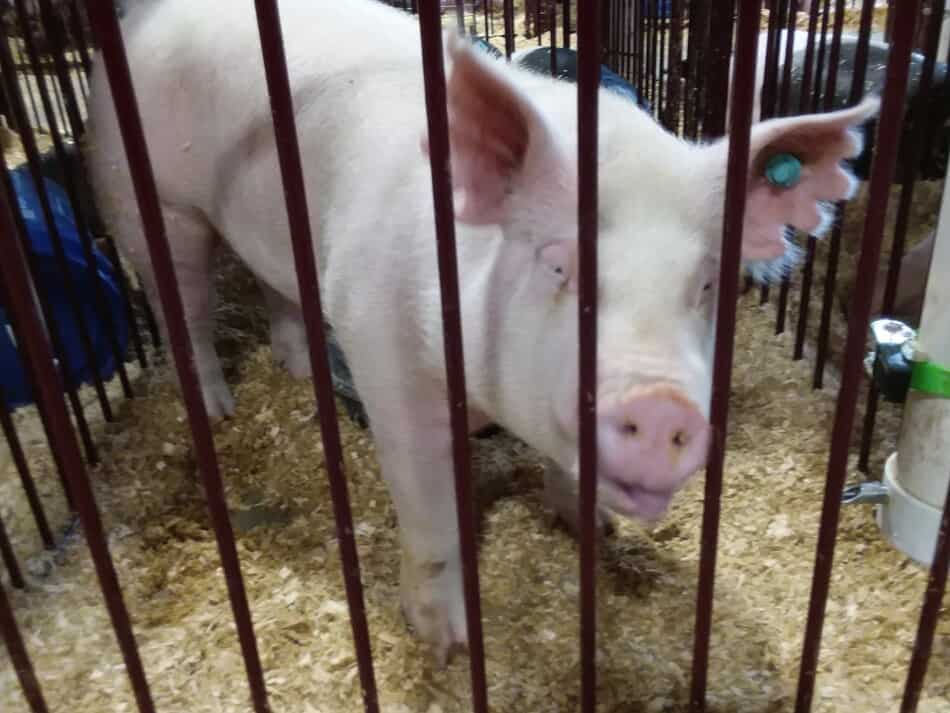
Locate the support businesses you will need for your pigs
Raising pigs requires support businesses of some sort, it may be vet care, feed stores or mills, or processors. The easier it is to find these things the more options your pig business has.
Pigs, especially, are needy in terms of pounds of feed to grow them out. You’ll need to have a reliable place to get the feed you need in the quantity you need, as well.
Additionally, you’ll need a processor to handle getting the pigs from the farm to the fork. How close is the nearest processor?
Even if you plan to sell live pigs, feeders or finished, you should still locate a butcher shop.
Why? Because anyone who buys pigs from you needs to have a processor lined up, too. No processors in your area means you’ll have trouble finding people who will buy your pigs.
The same is true if you plan to sell feeder pigs. Where are the feeder pig buyers going to get feed, vet support or processing? If you can’t find these things neither can they.
Consider which the different types of pig raising systems
In case you are not aware of it, you have a variety of options for raising your pigs.
You could do:
- farrow to finish, which is pigs born on your farm are raised up to market weight and sold, these pigs could be sold to an auction or directly to customers
- farrow to feeder, meaning you have the piglets born at your place and sell feeder pigs for someone else to grow the pigs to market weight
- feeder to finish, which means you buy feeder pigs and raise them up to market weight, this is a popular option around here, especially for Amish farmers with extra corn
- seasonal pigs, meaning you buy feeder pigs when you need them and sell them to your customers, this is what a lot of pastured pork raisers do, they do not have piglets born on their farm the piglets are purchased
These are broad categories, which can be broken down further into more specifics.
For instance, in some areas raising pigs on pasture is a huge marketing advantage, which would be done with any of the above groups. Check out Sheraton Park Farms as an example of this type of pig farming.
Another option is high welfare pig raising systems or specially feed pigs, again, all of which could be done with these groups listed above. This is an interesting article from a Dutch Pig Farmer who wants to end factory farming.
A third variation is breed specific pigs, Compart Duroc is a very successful breed based pork producer, I ran across them on a BBQ channel!
Know your estimated costs to raise pigs
Now we are getting into more of the math for raising pigs. If you are not a “math person” don’t worry, it’s not too hard, but it is vital.
A business must make money or it is just a hobby. If you are running a business, do the math.
Feed is your biggest cost for raising pigs
You’ll need to have an estimated budget of feed costs, starting with price per pound of feed. This is where your business will look really good, or really bad. Feed is your largest expense in pigs.
Feed mills, businesses that get in the whole grains and grind feed are the best places to get your pig feed. Not all areas have a feed mill, but if you do be sure to look there first!
The main ingredient in your feed will vary based on where you live, here it’s corn, but it can be milo, barley or many other grains that grow well close to your area.
It doesn’t really matter what specific grains the feed is made of since pigs can grow well on many grains, as long as the ration is balance for pigs, with a mineral mix included.
Can’t get any grain for your pigs? You don’t have to have grain to raise pigs, but they should have a high calorie food source to grow well. Grass alone will not be sufficient for the vast majority of pigs.
Source something locally, like whey, cheese trimmings or brewery waste. If you do not have a high calorie food for your pigs, raising pigs will be difficult in your area.
Buy all of your herd, or save back gilts to build as you go
You’ll also have the cost of breeding stock. Buy the best you can afford, always! Getting cheap stock will come back to haunt you later in terms of slow growth or poor litter quality. Get good pigs to start with.
Don’t forget to include the cost of increasing your herd as you grow.
This is an easy thing to forget, but unless you can start off with the number of females you need, you’ll have to keep some gilts back to grow your herd to your ideal operating size.
The reason this is a cost that gets forgotten is the gilt saved back for breeding costs you more than you would think.
She didn’t get sold like the rest of her litter, then she needs to be fed until she farrows, which costs more, as well.
I keep back my own gilts, this way I know what I am working with, but I am also very aware that those gilts do not make me money for about a year and a half, until I can sell the piglets from them.
Only you can determine if pigs are right for you
The purpose of this article is to get you thinking about the options for your pig business. No one can tell you what you should do or what will work for you and your area. Too bad, because that would be really nice!
I’ve got the easy job, I present the options or at least enough of them for you to start thinking and seeing what will work.
You’ve got the hard job, actually putting in the time on research and budgeting, then if it looks promising, getting started to make your plan a reality.
Are your pigs an investment or a business?
We need to go over some terms, mainly investment and business.
To me an investment is something you put money into and it grows, without too much hands on work from you. A business is something you do to make money that requires a lot of work and time from you.
Which one of these applies to your plan with pigs?
If you are still on the investment plan, know that pigs are not a hands off venture. Pigs as an investment is doable, you’ll just have to have system and automations in place and pay other people to do the hands on work.
Pigs as an investment will also require quite a bit of money to fund the set up and the initial start of your pig herd.
If you plan to spend tons of time to make your pigs a business, (this is what I have hands on experience with and am currently doing with my pigs) pigs just might work out for you.
